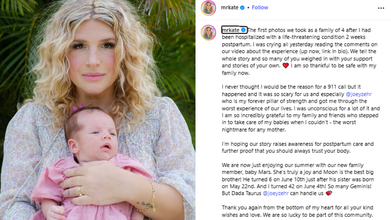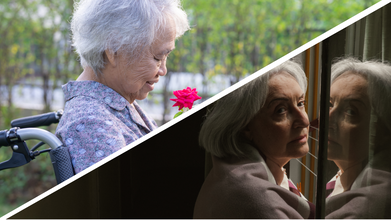- Health Conditions A-Z
- Health & Wellness
- Nutrition
- Fitness
- Health News
- Ayurveda
- Videos
- Medicine A-Z
- Parenting
- Web Stories
Diagnostic Anomaly: Rare Neurological Disorder Made 52-Year-Old Woman See People’s Faces Turn Into Dragons

As children we have all imagined just how fun it would be if we lived around mythical creatures like dragons, elves and werewolves. However, these are all impossible and magical beings remain a part of the fantasy world. But that was not the case for this woman, for whom dragons actually become her reality. Although she wasn’t living among actual dragons, it started looking to her like that when suddenly the people around her transformed into these mythical creatures.
In July 2011, a 52-year-old woman sought help at a psychiatric clinic in The Hague for a condition she'd had her whole life: seeing people's faces turn into dragon-like faces. This happened many times a day, and she also saw similar faces floating toward her from walls and screens. At night, she saw many of them in the dark.
But why was this happening? And what caused her to see these hallucinations, here is what the 2014 reports published in the Lancet explained.
How Did She View People?
Although she could see and recognize a person's real face, after a few minutes, it would turn black, grow pointy ears and a snout, and show scaly skin with huge, bright yellow, green, blue, or red eyes. As a child, this didn't bother her, but in her teenage years, she realized this wasn't how others saw faces. She felt alone and became depressed, leading her to abuse alcohol for many years. Despite these challenges, she was able to finish school, get married, have a daughter, and work as a school administrator. However, her difficulty with faces caused problems in her relationships and at work, forcing her to change jobs often.
After her symptoms got worse, she tried to get help. A local psychiatrist gave her medication that didn't work. Desperate, she reached out to Professor Oliver Sacks, a famous neurologist, who directed her to a team in The Netherlands.
The patient had a history of other visual symptoms, like seeing things move out of the corner of her eye or seeing large ants crawling on her hands. She knew her visions weren't real and described them as a "brain disorder."
What Was Her Diagnosis?
Doctors performed tests, including a brain MRI, which showed some small white spots but nothing that would fully explain her condition. The doctors believed her symptoms, known as prosopometamorphopsia (PMO), were likely caused by abnormal electrical activity in the parts of her brain that process faces and colors. PMO is a very rare condition that was first described in 1947.
What Is The Disease That Mentally Distorts People’s Face?
According to Prosopagnosia Research Center, Prosopometamorphopsia (PMO) is a rare condition that makes people see faces as distorted. The name comes from Greek words meaning "face" (prosopo) and "perceptual distortion" (metamorphopsia).
The brain has a complex network of regions for processing faces. When there's a problem in this network, it can cause various issues, including PMO.
Unsurprisingly, living with PMO can be very upsetting for people. Most cases only last for a few days or weeks, but some people experience these distortions for years. Because only about 75 cases have been reported, we believe the condition is quite rare.
How Can You Treat People Who See Distorted Faces?
After a thorough evaluation, the doctors stopped her previous medications and started her on a new one called valproic acid. For the first time in her life, she had days with no symptoms. However, she started hearing loud bangs after falling asleep, so the doctors switched her medication to rivastigmine. This new drug controlled both her visual and new auditory symptoms well enough for her to function normally.
Thanks to the new treatment, her symptoms are under control. She has kept the same job for three years and her relationships with her colleagues have greatly improved.
Youtuber Shares How She Went Into A Coma 2 Weeks After Giving Birth: Can Complication During Childbirth Become Deadly?

(Credit-Mrkate/Instagram)
Childbirth and pregnancy are one of the most hardest things a human body can go through. Although things have gotten easier, in terms of care and ensuring the mother’s safety while giving birth, the small percentage of mortality looming overhead does not disappear. ‘But it’s just the pregnancy and childbirth that’s the tough part, right? Once you get past that you no longer have to worry about other complications.' But that is not entirely true either and facing this reality, the YouTube duo, Mr. Kate, shared their birth story.
You may know Mr. Kate from their YouTube channel, that has amassed over 3 million subscribers, sharing their life, stories and other fun challenges. In a recent video, they shared their birth story and the unexpected challenges they faced.
In the video, Kate Albrecht and Joey Zehr, welcomed their second baby together in a home birth. Their first child was born in 2019 in the hospital and Kate hoped for her second and last pregnancy she could experience a natural homebirth. In an interview with the People, she shared how she wanted to do a home birth because it sounded “really magical”, and since they chose to have their first birth at hospital, she thought for her second and last pregnancy, she was ready to challenge herself with a home birth.
How Do Home Births Work?
According to the National Health Services (NHS) when cosidering a home birth, one should be very careful and make sure they are making a well-informed choice. They explain that during a home birth, a community midwife, will come to look after you during the birth and a short while after the baby is born, they will assist you in different things along with making a birth plan suitable for the mother’s care.
Kate explained that she and Joey engaged in "dual care," seeing both a midwife and an OB-GYN to ensure a safe delivery. The birth of their daughter, Mars, was a success, and the baby was born en caul (still inside the amniotic sac), a rare and significant event.
Following the birth, Kate was prepared for a smoother recovery than her first. However, it was just 2 weeks after she gave birth after which a medical emergency arose.

Can Pregnancy Complications Occur Weeks After Giving Birth?
After giving birth, Kate felt exhausted and had severe headaches and a bad backache. When she went for her check-up, doctors told her these symptoms were normal for someone recovering from childbirth. However, two weeks after Mars was born, Kate suddenly collapsed at home. When her husband Joey found her, she was unconscious and having a seizure.
Joey called 911, and paramedics quickly figured out that Kate was suffering from eclampsia, a dangerous condition that can cause seizures. It's connected to preeclampsia, a blood pressure issue that can happen during pregnancy. In Kate's case, it happened after she gave birth, which is rare. Even though she had been perfectly healthy during her pregnancy and her tests for preeclampsia were negative, her body had developed the condition in the weeks after her baby was born.
Can Childbirth Complications Lead To Coma?
At the hospital, doctors put Kate in a medically induced coma to protect her brain. Scans showed she did not have any brain bleeding, which was a huge relief. However, they did find a blood clot in a vein near her kidney. This explained the terrible back pain she had been feeling.
After a few days, Kate was finally able to wake up from the coma. She had to stay in the hospital for a little while, but she was eventually sent home with medication to help prevent future blood clots.
Kate and Joey decided to share their story to help other parents. They learned that postpartum eclampsia can happen up to six weeks after a baby is born. They want everyone to know that even if you have a healthy pregnancy, you still need to be aware of the signs of this condition and get medical help for any unusual symptoms after giving birth.
Although the complications were scary, Kate and Joey are happy and thriving with the new addition to their family. Their fans and well-wishers commented supporting the couple and advocating how important postpartum care is.
78-Year-Old Retired Professor Shared His Secret To Keeping 'Razor Sharp' Memory Even As He Ages

(Credit-Canva)
It is no secret that as we age our memories decline and fade. We have all seen our grandparents age and slowly lose the agility they had when we were kids, how they remembered to bring our favorite sweets and foods, and tell us stories of their youth. However, this is no longer easy for them as their minds take an obvious turn for the worse.
We all wish to see our aging elders live their days peacefully and healthily and one of those aspects is their memory. However, it doesn’t always have to be this bleak, there are many people who have aged and also kept their minds strong, and this 78-year-old professor is giving everyone a run for their money.
Anthony D. Fredericks, a former education professor at York College of Pennsylvania, shared with CNBC, his simple habits that he credits with keeping his brain in top shape.
5 Habits That Keep Your Brain Strong Over 70
Never Stop Learning
Your brain loves a challenge. Whether you're learning a new language, taking a class, or doing a crossword puzzle, challenging your mind helps it form new connections. Research has even shown that staying mentally active over the years can lower your risk of dementia. As Fredericks says, reading widely and staying curious keeps your mind engaged.
Stay Social
Being lonely doesn't just make you sad; it can also slow your brain down. Having strong connections with friends and family has been linked to a lower risk of memory problems, lower blood pressure, and a longer life. An old professor, Fredericks, stays sharp by regularly spending time with friends, volunteering, and seeing family, which he believes helps his mind and overall well-being.
Keep Things Organized
Setting goals and staying organized can make your brain work better. When you organize your tasks, you activate the part of your brain responsible for planning and making decisions. Fredericks uses a simple, color-coded sticky note system to keep track of his daily tasks, a habit he says has made a huge difference.
Stay Active
Physical exercise is very important for a healthy brain. It increases blood flow to the brain, which helps create new brain cells and strengthens connections between them. Experts recommend at least 150 minutes of moderate activity each week, like brisk walking, swimming, or gardening. Fredericks himself swims and walks regularly to stay active.
Eat and Drink Smart
What you eat has a big impact on your brain health. A healthy diet, along with drinking plenty of water and getting good sleep, can help keep your mind sharp. Fredericks makes sure to eat heart-healthy foods like berries, leafy greens, and salmon. He also drinks at least eight glasses of water and gets at least seven hours of sleep every night.
Other Tips To Keep Your Mind Sharp As You Age
According to the National Institute of Aging, there are many ways to keep your mind as healthy as your body when you age. Including the points mentioned above by the professor, here are some additional tips to keep your memory strong.
Manage Blood Pressure
Keeping your blood pressure in a healthy range is not just good for your heart; it's also good for your brain. High blood pressure in middle age can increase the risk of memory and thinking problems later on. Get your blood pressure checked every year, and talk to your doctor about exercise, diet changes, or medicine if needed.
Address Health Problems
Conditions like a stroke or depression can seriously affect your brain. Getting the right treatment for these issues can help prevent or delay mental decline.
Be Smart About Medications
Some medicines can cause confusion or memory loss, especially in older people. Always talk to your doctor if you have concerns about your medications and never stop taking a prescribed medicine without their advice.
Meet This 32-Year-Old Woman, Who Survived Triple Organ Transplant And Cancer That Left Her Blind

(Credit-Northwestern Memorial Hospital/Canva)
It is not always that people get a second chance to change their lives. Terrible tragedies that can leave people struggling with illnesses and life-long disabilities, due to no fault of their own, can happen to anyone. However, this was not a story for her, it was her reality.
Jessica Lopez was diagnosed with cancer as an infant. The treatments saved her life, but they also caused long-term damage to her heart. By the time she was in her early 30s, she was facing a dire situation: her heart, liver, and kidneys were all failing. Her only hope was a rare and risky triple-organ transplant.
In a news release, her doctors at Northwestern Memorial Hospital explained how they were determined to help her. Despite the slim odds—this type of transplant had only been performed 59 times in the U.S. before—her positive attitude inspired them to take on the challenge.
Also Read: Is Pink Salt Weight Loss An Ancient Ayurvedic Ritual Or AI-Fueled Fad Trend?
Can Childhood Cancer Lead To Organ Failure?
As a child, Jessica battled leukemia and an eye cancer that left her blind. Although she beat the cancer, the aggressive treatments had a lasting effect. Unfortunately, it's not uncommon for childhood cancer survivors to have a much higher risk of heart problems later in life due to the harsh impact of treatments. In Jessica's case, her doctors believe this is what led to her heart failure, which then caused her liver and kidneys to fail.
After being placed on the transplant list, Jessica waited for a matching donor. The wait for three organs is especially long because they all must come from a single person. However, on February 24, a match was found.
The surgery was incredibly complicated. A team of surgeons worked together to transplant the heart and liver at the same time, followed by a separate procedure for the kidney. This allowed them to complete the surgery as quickly as possible.
Who Needs a Triple-Organ Transplant?
According to Mayo Clinic, triple-organ transplants are considered for people whose disease has damaged three of their major organs. For example, a person with severe heart failure might have a damaged heart that then causes their liver and kidneys to fail. In other cases, a problem with the liver or kidneys can lead to heart failure.
Because this surgery is so demanding on the body, doctors look for patients who are otherwise in good health. The patients who receive these transplants are often children or young adults, but older patients have received them as well.
What Are The Risks of Triple-Organ Transplant?
Getting a triple-organ transplant is a long and difficult process. First, the patient is put on a special transplant list, waiting for a single donor who can provide all three organs.
The surgery itself is extremely complex and can last for many hours. The heart is transplanted first, since it is the most fragile organ. The surgical team works with a detailed plan, like a "playbook," to make sure everything goes smoothly.
While a triple-organ transplant offers a chance at life for patients who have no other options, it also comes with higher risks than a single-organ transplant. The patient is at risk for serious complications like bleeding and infection. However, a highly skilled medical team can catch and treat these problems early, which is key to success.
A New Chance At Life
Jessica's journey back to health has been long, but she is now thriving with her new organs. She says she feels "reborn" and has more energy than ever. She has a stronger heartbeat and is filled with gratitude for her organ donor's selfless choice, which gave her a second chance at life.
Jessica, who has been cancer-free for 20 years, has never let being blind stop her from living a full life. She navigates her world with ease and is even planning a new career in forensics. She is also happily planning her wedding for 2026, looking forward to a bright future with her fiancé.
© 2024 Bennett, Coleman & Company Limited

